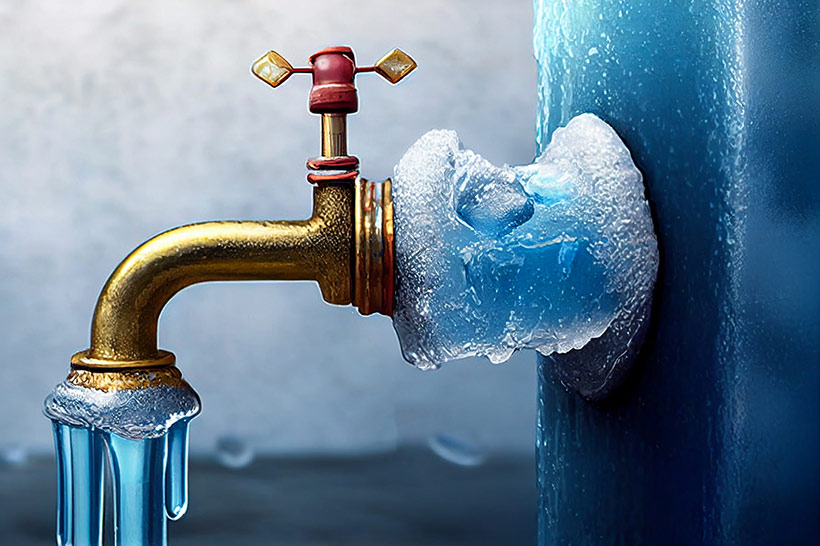Shielding Pipes from Cold Weather Issues: Critical Tips
Shielding Pipes from Cold Weather Issues: Critical Tips
Blog Article
Just about everyone has their own unique assumption when it comes to Prevent Frozen Pipes .

Cold weather can ruin your pipes, particularly by freezing pipes. Below's just how to prevent it from happening and what to do if it does.
Intro
As temperature levels drop, the risk of frozen pipelines increases, possibly bring about pricey repair work and water damages. Comprehending how to stop icy pipelines is crucial for property owners in chilly climates.
Understanding Icy Pipes
What creates pipes to freeze?
Pipelines ice up when revealed to temperature levels below 32 ° F (0 ° C) for extended durations. As water inside the pipes ices up, it broadens, taxing the pipe wall surfaces and potentially causing them to break.
Threats and damages
Icy pipes can lead to water system interruptions, residential property damage, and costly fixings. Ruptured pipelines can flood homes and cause substantial structural damage.
Indicators of Frozen Pipes
Identifying frozen pipes early can avoid them from bursting.
How to identify frozen pipelines
Look for decreased water circulation from taps, unusual odors or noises from pipes, and visible frost on subjected pipelines.
Prevention Tips
Shielding prone pipelines
Cover pipelines in insulation sleeves or utilize heat tape to secure them from freezing temperatures. Focus on pipelines in unheated or outside areas of the home.
Home heating methods
Keep interior areas effectively heated up, specifically areas with plumbing. Open up cupboard doors to allow cozy air to flow around pipes under sinks.
Protecting Outdoor Pipes
Yard tubes and exterior faucets
Separate and drain pipes yard pipes before winter season. Set up frost-proof faucets or cover exterior faucets with insulated caps.
What to Do If Your Pipelines Freeze
Immediate actions to take
If you suspect frozen pipes, maintain taps open to ease pressure as the ice thaws. Use a hairdryer or towels taken in warm water to thaw pipes slowly.
Long-Term Solutions
Architectural changes
Think about rerouting pipes away from outside walls or unheated areas. Add extra insulation to attic rooms, cellars, and crawl spaces.
Updating insulation
Buy top quality insulation for pipelines, attics, and wall surfaces. Appropriate insulation assists maintain constant temperature levels and decreases the danger of frozen pipelines.
Final thought
Protecting against icy pipes requires proactive procedures and quick feedbacks. By recognizing the reasons, indicators, and safety nets, home owners can safeguard their pipes throughout winter.
Helpful Tips to Prevent Frozen Pipes this Winter
UNDERSTANDING THE BASICS: WHY PIPES FREEZE AND WHY IT’S A PROBLEM
Water freezing inside pipes is common during the winter months, but understanding why pipes freeze, and the potential problems it can cause is crucial in preventing such incidents. This section will delve into the basics of why pipes freeze and the associated problems that may arise.
THE SCIENCE BEHIND FROZEN PIPES
When water reaches freezing temperatures, it undergoes a physical transformation and solidifies into ice. This expansion of water as it freezes is the primary reason pipes can burst. As the water inside the pipe freezes, it expands, creating immense pressure on the walls. If the pressure becomes too great, the pipe can crack or rupture, leading to leaks and water damage.
FACTORS THAT CONTRIBUTE TO PIPE FREEZING
Low Temperatures: Extremely cold weather, especially below freezing, increases the risk of pipes freezing. Uninsulated or Poorly Insulated Pipes: Pipes located in unheated areas, such as basements, crawl spaces, or attics, are more prone to freezing. Insufficient insulation or lack of insulation altogether exacerbates the problem. Exterior Wall Exposure: Pipes running along exterior walls are susceptible to freezing as they encounter colder temperatures outside. Lack of Heating or Temperature Regulation: Inadequate heating or inconsistent temperature control in your home can contribute to frozen pipes. PROBLEMS CAUSED BY FROZEN PIPES
- Pipe Bursting: As mentioned earlier, the expansion of water as it freezes can cause pipes to burst, resulting in significant water damage.
- Water Damage: When pipes burst, it can lead to flooding and water damage to your property, including walls, ceilings, flooring, and personal belongings.
- Structural Damage: Prolonged exposure to water from burst pipes can compromise the structural integrity of your home, leading to costly repairs.
- Mold and Mildew Growth: Excess moisture from water damage can create a favorable environment for mold and mildew growth, posing health risks to occupants.
- Disrupted Water Supply: Frozen pipes can also result in a complete or partial loss of water supply until the issue is resolved.
WHY CERTAIN PIPES ARE MORE PRONE TO FREEZING
- Location: Pipes located in unheated or poorly insulated areas, such as basements, crawl spaces, attics, or exterior walls, are at higher risk of freezing.
- Exterior Pipes: Outdoor pipes, such as those used for irrigation or exposed plumbing, are particularly vulnerable to freezing as they are directly exposed to the elements.
- Supply Lines: Pipes that carry water from the main water supply into your home, including the main water line, are critical to protect as freezing in these lines can affect your entire plumbing system.
- Underground Pipes: Pipes buried underground, such as those connected to sprinkler systems or outdoor faucets, can be susceptible to freezing if not properly insulated.
https://busybusy.com/blog/helpful-tips-to-prevent-frozen-pipes-this-winter/
:strip_icc()/snow-outdoor-faucet-pipes-4af65d1e5e904fb1aa7bf74071fe5d89.jpg)
I hope you enjoyed our part on How to Prevent Your Pipes From Freezing. Thank you for spending some time to read our post. Do you know about another person who is very much interested in 6 Ways to Prevent Frozen Pipes? Please feel free to share it. Thanks a lot for taking the time to read it.
Get Estimate Report this page